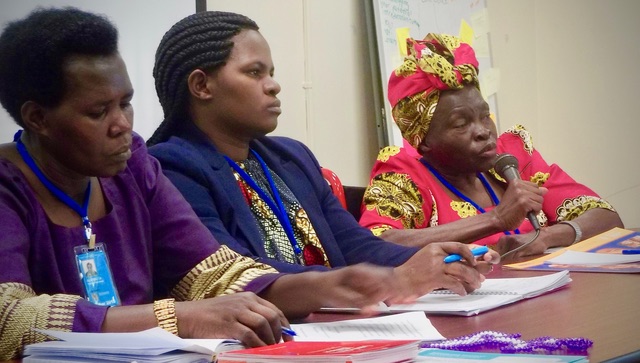Blog
#timesup on the silence
 Coming home after attending the 62nd Commission on the Status of Women (CSW), I was encouraged to see more participation from women with disabilities in this global women’s rights forum.
Coming home after attending the 62nd Commission on the Status of Women (CSW), I was encouraged to see more participation from women with disabilities in this global women’s rights forum.
I felt hopeful that the rights of women and girls with disabilities were addressed in the CSW’s agreed conclusions adopted by the Commission.
I was witnessing the beginning of a shift towards a more inclusive women’s movement after decades of work spearheaded by women with disabilities. However, it struck me that it has taken over half a century to get to a place where our voices are beginning to be heard.
Sixty-two years of campaigning by women’s rights activists and strategy meetings with United Nations bodies and governments to address the systemic inequality women and girls face and yet, silence on issues the most marginalized women and girls face. I found myself asking why.
Why the silence from our sisters who are campaigning to end gender-based violence, dismantling discrimination, and seeking a pathway forward towards gender equality?
In a world where:
- 90% of women with intellectual disability in Australia have experienced gender-based violence (1)
- Deafblind women and girls in Malawi are systemically raped and in response, their families forcibly sterilize them
- In Haiti, three Deaf women were lynched and killed in 2016 for using Sign Language and the perpetrators have still not been prosecuted for these heinous crimes
- Forced sterilization against women and girls with intellectual and psychosocial disabilities is being proposed as part of the new gender-based violence legislation in Indonesia
- Women’s health clinics are inaccessible in Uganda and there are no Sign Language interpreters available to women when accessing reproductive health services
- In the U.S., women with disabilities have a 40% greater chance of experiencing violence from an intimate partner than women without disabilities (2)
It is outrageous and unacceptable to be silent about the entrenched discrimination and stigma of women and girls with disabilities that leads to systemic violence.
BREAKING THE SILENCE
Violence is so wide-spread that it has become normalized for many women and girls with disabilities, their families, and communities. It has become a part of what a girl with a disability expects. Violence has crept so deeply into their lives through the systems of oppression that when it happens, it is often not reported.
The silence on the vicious and systemic violence and discrimination must end. In the midst of the #TimesUp movement, the time is up on saying nothing.
We must all act now to end the violence, abuse, exploitation, discrimination, and isolation women and girls with disabilities face throughout the world.
Funding and support are critical for breaking this silence.
Support from donors is key for defying the oppressive shackles of sexism, ableism, and gender inequality. Yet, human rights funding has also been largely silent on the rights of women and girls with disabilities. An analysis of human rights funding shows that only 0.3% of human rights funding went to support the rights of women and girls with disabilities; only 1.5% of funding for women and girls’ rights focused on women and girls with disabilities; and only 9.5% of disability rights funding focused on women and girls with disabilities (3).
As women rights activists with disabilities from Rwanda and Uganda shared at the Commission on the Status of Women, this funding is needed in order to push forward real changes in the lives of women and girls with disabilities.
Funding to empower women and girls with disabilities to lead rights advocacy not only brought more voices to the table, it also empowered individual women and girls to stand up to violence and say #TimesUp on the normalization of violence and to tell their communities that: this ends with me.
As Gaudence Mushimiyimana, the Executive Director of the Rwandan Organization of Women with Disabilities said recently at the CSW:
We, women and girls with disabilities, believe, and we are convinced, that nothing will happen if we ourselves are not organized so that change can happen. If we empower women with disabilities to be self-advocates in the community, we build their self-esteem to value themselves. This is when they begin to change, and they report cases of violence.
GUIDING OUR WORK TO ADVANCE GENDER EQUALITY
At the Disability Rights Fund and Disability Rights Advocacy Fund (DRF/DRAF), we are changing the funding landscape by supporting organizations led by women with disabilities and advocacy work that promotes addresses their rights. Fourteen percent of our funding goes to organizations of women with disabilities. Often times, these are small, emergent or grass-roots based organizations that have never received prior donor funding. DRF/DRAF are among the first donors to recognize their potential and the urgent need for funding.
We invite funders and allies to amplify the voices of all women and girls with disabilities, including those from the most marginalized communities.
To help make the shift toward gender and disability funding, DRF/DRAF has produced Gender Guidelines to institutionalize our commitment and set-forth a road map for how we, as a donor, will increase our support to women and girls with disabilities.
The Gender Guidelines address funding at the intersections of gender and disability moving from a gender inclusive approach to a gender transformative approach seeking to challenge gender norms and stereotypes and transform power inequities.
I am proud to have led the creation of such a unique tool. I encourage donors, philanthropists, women’s rights activists, disability rights activists, and other civil society stakeholders to use these Guidelines to spark conversations in your own spaces. Together, we can advance towards a more gender inclusive and transformative approach.
It takes courage to break the silence. For all of the women activists with disabilities around the world bravely shattering the oppressive silence, I dedicate these guidelines to you.
References
- Australian Cross Disability Alliance, “Inquiry into Violence, Abuse and Neglect against People with Disability in Institutional and Residential Settings,” August 2015
- American Psychological Association, Abuse of women with disabilities, Facts & Resources
- See Disability Rights Fund, “Supporting Inclusive Movements: Funding the Rights of Women with Disabilities” and Human Rights Funders Network, “Advancing Human Rights”
 Lisa Adams is a disability rights and women’s right activist and the former Program Director of the Disability Rights Fund / Disability Rights Advocacy Fund.
Lisa Adams is a disability rights and women’s right activist and the former Program Director of the Disability Rights Fund / Disability Rights Advocacy Fund.